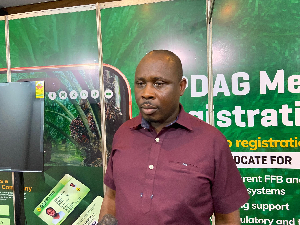Government on Wednesday said it had improved the physical security of the nation's armouries and magazines as part of the framework to control arms proliferation in the country.
It is also ensuring effective supervision of arms given to security personnel and encouraging resolution of conflicts through dialogue rather than the use of arms.
Dr Kwame Addo-Kufuor, Minister for Defence, said the steps were among measures that were being pursued to facilitate the work of the National Commission on Small Arms and Light Weapons.
Dr Addo-Kufuor was speaking at the closing of a three-day consultative workshop on "Ghana's Action Programme on Small Arms in the Context of the United Nations Programme of Action on Small Arms (UNIPoA) and the ECOWAS Moratorium, at Nungua, near Accra.
Mr Joseph Akudibillah, Deputy Minister for Defence, read Dr Addo Kufuor's speech at the workshop, which the Foundation for Security and Development in Africa (FOSDA), a non-governmental organisation (NGO), organised jointly with Action Aid another NGO; UNICEF and UNDP and was attended by representatives of 45 civil society organisations.
Dr Addo Kufuor said aside the retrieval of illicit arms in circulation and the continued ban on the import and export of small arms, government had also increased co-operation with other countries in the West Africa Sub-Region to strengthen the relevant laws on trafficking and management of small arms and light weapons.
It is also further co-operating with the United Nations and civil society organisations to effectively implement laws pertaining to the UN Security Council Arms Embargo.
Dr Addo Kufuor said it was an irony that developing nations were buying many of the small arms from the developed countries with their scarce foreign exchange.
He questioned the moral and religious justification of the income accrued to partakers in the illicit trade when many lives were lost as a result.
"In spite of this stark reality, and all the various measures and policies put in place, new weapons are being manufactured, new import and export contracts are being initiated and concluded, money is changing hands for new "Small Blood Arms" and light weapons all over the continent."
Dr Addo Kufuor said the illegal local manufacture of small arms, used in the various ethnic conflicts and criminal activities was a major problem for government, and added that it was necessary to engage manufacturers of small arms in a serious dialogue to encourage them to bring their skills in the open, organise, formalise and control their activities.
The dialogue should also encourage collaboration between manufacturers and the security agencies, and also keep very comprehensive registers of those who purchase weapons and establish codes of conduct and behaviour governing those who could have access to weapons.
The Defence Minister announced that government was drafting a bill on firearms and invited civil society to input at the appropriate stage of the process of legislation.
He reiterated government's commitment to ensure that the National Commission on Small Arms was well supported to perform its task as stipulated by the UNPoA.
The Commission would be expected to formulate policies and programmes and ensure the provision of laws, regulations and administrative procedures towards the effective control of the production, export, import, transit and transfer of small arms and light weapons. It would also facilitate the training of security service personnel in modern methods of small arms control.
In a communique, read by Prof Haruna Yakubu, Dean of Students, University of Cape Coast, the participants registered their fears and worries about the conflicts in the country and in the Sub-Region, and called on Government to review legislation on domestic arms to reflect the current security situation.
Government should also take the lead in discussing the control of the proliferation of small arms in the West Africa Sub-Region as well as the African continent, and team up with civil society to resolve and prevent local conflicts.
They also asked government to factor in a gender perspective in conflict prevention, management and resolution processes, and also to facilitate and support gunsmiths to produce alternative non-lethal tools as a source of earning their livelihood.
General News of Thursday, 26 June 2003
Source: gna












